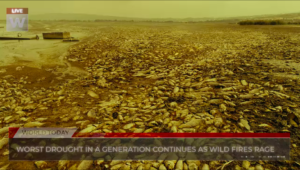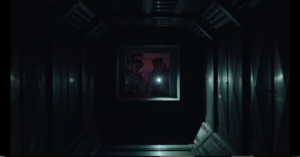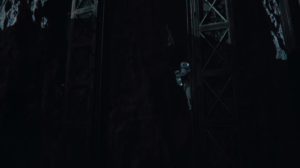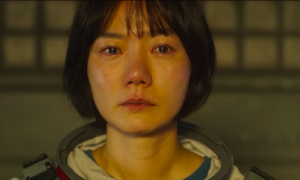
Netflix and South Korea have undoubtedly had one of the most successful relationships of 2021. The seeds that they had first sown in 2016 only grew with their later contracts with Korean TV Networks, and this, alongside original productions, has born phenomenal fruit over the last few years. As noted by Director of International Originals Kim Min-young, one of the biggest attractions of the platform is in allowing for the exploration of more controversial topics and story elements, such as violence, sex or gore. Squid Game is the shining beacon of potential here, using graphic blood, injury, and even surgery, to underline the brutality of the capitalist structures it is critiquing.
It is perhaps no surprise then that Netflix has chosen to bookend 2021 with another intense, often violent thriller that takes on arguably the biggest problem of our modern world: climate change. The Silent Sea, written by Park Eun-kyo and directed by Choi Hang-yong, is adapted from his own 2014 short film of the same name. Set in the not-too-distant future, the world has experienced ‘The Great Drought’, leaving the seas dried up, rain a memory, and water a resource that is strictly rationed according to class gradients. Against this backdrop, a team of soldiers and scientists are sent on a mission to the lunar research station, Balhae. Here, five years previously, a terrible accident left the entire crew dead, but the new crew are simply ordered to retrieve a mysterious sample.
With an absolutely gem-encrusted cast (Bae Doo-na and Gong-yoo lead, with Yoo’s Squid Game co-stars Heo Sung-tae and Yu Seoung-ju also appearing), striking cinematography and such important, grand themes at play, The Silent Sea marks a milestone in Netflix’s relationship with Korean drama. In this show, we see a level of confidence and investment which signifies Netflix’s understanding of the power that the Hallyu wave has.
Though they are two entirely different beasts, the similarities between Squid Game and The Silent Sea are significant in their incredible relevance to modern concerns. Whilst the capitalist critique is far more all-encompassing in the former than the effects of climate change are in the latter, both shows do cleverly tap in to issues that we are going to face soon, if we are not already. The Silent Sea sets up this dry dystopia for the audience extremely effectively, with brief montages of queues for water rations and news of sky-rocketing infant mortality rates grounding us in this new world without being too overt.
This review contains spoilers
We come to understand that water is rationed according to status when we see characters at the Space and Aeronautics Administration (SAA) tapping their letter-graded cards to receive it. This social grading is one of the first things we come to learn about our central character, Dr Song Ji-an (Bae), an insular but brilliant scientist who is reluctant to be recruited for a moon mission until she learns that it is to the location where her sister died. Song has a gold card, allowing unlimited water access, and attracting the attention of the inquisitive Dr Hong Ga-young (Kim Sun-young). It is a delicate touch to let the audience know that something has given her this status, and that it is highly sought-after.

There are many of these moments throughout the drama that remind us of how scarce water has become; Gong Yoo’s Han Yoon-jae has flashbacks to his sick daughter, ailing in part due to her lack of access to enough water; Dr Hong notes that the water they find on the Moon is the clearest she’s ever seen; and the SAA’s Director dreams of the feeling of rain. These additions and observations are built subtly across the show’s eight episodes to illustrate how pervasive water scarcity would be as a global issue.
However, it is not just these subtle sketches that pull the scarcity of an essential resource to the centre of The Silent Sea. The plot itself revolves around it, and tells a worryingly recognisable tale of the destructivity of greed in the face of acquiring something so essential. This mission to Balhae station, sold to its participants as simply to retrieve an unknown ‘sample’ in twenty-four hours and return to Earth, turns out to be anything but.
After a crash-landing that ultimately kills one of the crew, their eventual discovery of the lunar station reveals that what killed everyone on board was not, as they were told, a radiation leak, but some kind of drowning. This is later revealed to be the result of ‘lunar water’, a substance that multiplies rapidly upon contact with a living organism. Great news for the climate disaster, surely? Well, maybe, only this water multiplies so fast on contact with a human that they drown in a huge excess of water produced from their own lungs.

So actually, not so great. We see the effects of this lunar water on multiple crew members, present and past (through flashback), causing madness in combination with projectile vomiting of huge amounts of water. Lovely stuff. As the crew members, and particularly Dr Song, realise the destructiveness of this water, they are increasingly convinced of the need to be extremely careful in its handling, and question if it should be brought to Earth at all. However, this is at odds with the SAA’s demands to bring it back before any other government can get their hands on it, and is also the cause of several crew betrayals, as members reveal themselves to be mercenary spies stopping at nothing to get the samples out of the base and onto Earth.
Through these dramatic reveals of the nature of the water, as well as those seeking it, the show illustrates the true dark potential for evil in the face of scarcity. While the lunar water’s effects are shown in full horror- water seeping from ears, faces bloating with purple veins, hypnotic point-of-view hallucinations- this does nothing to deter those who want to use its multiplying potential on Earth. The observations of the more reasonable characters that this resource needs careful consideration go unheeded, and the safety of the crew is ignored in order to secure the samples for one particular government at all costs. Even in this world, desperation to obtain power over resources still means more than expert opinion or collective safety. How sadly familiar.
Through the characters of SAA Director Choi (Gil Hae-yeon) and turncoat engineer Ryoo Tae-seok (Lee Joon), we see a chilling detachment and dogged perseverance towards obtaining their goal that shows how people of different power levels can be turned towards savagery in the name of gain. Ryoo is a particularly strong example of this, as a spy who murders and sabotages his crewmates in order to obtain the water samples for his employers. Lee Joon’s portrayal is terrifyingly opaque, largely calm and determined. It’s a great representation of what people can do get something that determination has driven them to.

The character of Ryoo Tae-seok, psychopathic in his goal-seeking, in combination with the visceral effects of the lunar water on the crew members, are just some of the horror elements that underpin the atmosphere of The Silent Sea. Again, in common with some of the critiques of Squid Game that compared it to commonly-themed shows or movies, there is a lot to link The Silent Sea to its science fiction ancestors.
The initial issue of resource scarcity is similar to Interstellar. The mysterious lunar station that may have a monster in its corridors is pure Alien. The obscure contaminant that causes bizarre symptoms and violent death is, well, most zombie movies. Whilst it is more derivative than Squid Game, it is also a strong enough narrative, led by strong enough performances, to move above being just a collection of references. When used well, referencing helps to frame a narrative for an audience with something they are familiar with, and that is how it works in this drama.
Aside from the film references, the cinematography of The Silent Sea is also on a grand enough scale to be easily imaginable on a big screen. When setting the majority of a drama on the Moon, there are essentially two outcomes: breath-taking or utterly makeshift. With a production team like Netflix at the reins, it is not surprising that we get the latter. There are multiple wide shots of the lunar surface with the Moon in the background, majestic and detailed enough to truly evoke real space imagery. There are also multiple shots positioning characters within this scenery, for example when Han Yoon-jae is stuck on a ladder in a huge lunar crater.

With the lens as wide as possible, we see him as a tiny part of a vast frame, enveloped largely in shadow and darkness, giving the best possible sense of the intimidatingly unreal landscape of another world. Supported by a colour saturation that seeps the drama in tones of greys and blacks, the camerawork in this drama is truly exceptional in setting the scene as otherworldly, in both a beautiful and an eerie sense.
With cinematography this accomplished, and film references peppering the visuals, the show almost necessitates big name stars to complete the filmic nature of this drama. In Bae Doo-na and Gong Yoo, this is easily accomplished, as both are such clearly talented actors with such recognisably striking profiles. Bae Doo-na in particular is the nerve centre of this story: we are introduced to the other crew members through their introductions to her, and it is her intuition that the audience follows to discover the true nature of the lunar water and the effects that it has had on the lunar station.
Her performance is equal parts restrained and empathetic: we can always understand how she is feeling, but from the simplest intonations of speech and the tiniest facial movements. She is a masterful choice to lead the drama, and her cold-yet-caring scientist, while not necessarily the most original basis for a character, is elevated to a compelling lead as the narrative spirals more into revelation and violence.

Through this amazing cinematography and top-drawer cast, we can see that Netflix has clearly placed all of its bets on The Silent Sea as the next big cornerstone of its original Korean content. In combination with the climate change theme, one that is bold and inevitably political in today’s climate, it pulls no punches in claiming its place as Korean Netflix’s science fiction gem. It sits in the crown alongside the company’s already glittering horror offering Kingdom and political satire of Squid Game. The confidence behind The Silent Sea paid off in an exciting, beautiful and thought-provoking thrill ride, and it is even more exciting to think about what this could mean for Korean Netflix’s offerings in the new year.
(Spot.ph. Images via Netflix)


